|
|
|
Sort Order |
|
|
|
Items / Page
|
|
|
|
|
|
|
| Srl | Item |
| 1 |
ID:
131790
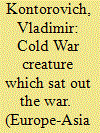

|
|
|
|
|
| Publication |
2014.
|
| Summary/Abstract |
A substantial body of literature argues that government funding motivated by the Cold War shaped (or distorted) the content of the American academic disciplines. This article tests the impact of such funding on the academic study of the Soviet economy, a small field created to help fight the Cold War. It documents the amount of attention given by researchers to the military sector of the Soviet economy, the topic of central importance for the Cold War, and finds that their publications largely ignored it. Considerations other than the interests of the sponsors determined the choice of topics in the discipline.
|
|
|
|
|
|
|
|
|
|
|
|
|
|
|
|
| 2 |
ID:
132779


|
|
|
|
|
| Publication |
2014.
|
| Summary/Abstract |
Simultaneous rapid rise in both the world oil and agricultural commodity prices have increased interest in determining price transmission from oil prices to those of agricultural commodities. However, although a lot of the empirical research has studied the relation between oil price changes and economic activity, it is surprising that little research has been conducted on the relationship between oil price shocks and the large-size emerging industrial countries agricultural market. Therefore, the main goal of this study is that we are try to use the more detail and new China's weekly data which from 2004/9 to 2012/9 to fill this gap. This study examines the short and long-run interdependence between China fuel oil prices and the average of different kinds of key agricultural commodity prices in China. To this end, the Toda-Yamamoto causality approach and impulse response analysis method are applied to identification of the long and short-run interrelationships. In contrast to lots of the traditional causality analysis indicates that the oil prices and the agricultural commodity prices do not influence each other, our result is mix: we have inferred that the fluctuation of fuel oil price has a short-run effect on the dynamics of agricultural products in China; however, there are no significant in the long-run effects.
|
|
|
|
|
|
|
|
|
|
|
|
|
|
|
|
| 3 |
ID:
123433


|
|
|
|
|
| Publication |
2013.
|
| Summary/Abstract |
An internal audit function (IAF) should positively impact financial reporting and governance, and add value to its organization. The study provides evidence on IAF factors (i.e. characteristics, activities, and work areas) associated with these types of impact and whether these factors, and their influence on various impacts, differ between a developed and an emerging economy (i.e. the USA and Turkey). Factors positively associated with financial reporting in the USA are assurance activities, control work, and competence; in Turkey, significant factors are governance work and competence. For governance, it is found that the factors positively associated with it in the USA include assurance activities, governance work, and competence; in Turkey, the significant factors are governance work and competence. In the USA, assurance activities are negatively associated with adding value, while consulting activities, risk work, and control work are positively associated with this measure. In Turkey, only risk work and control work are positively associated with adding value. Finally, several measures of IAF objectivity are not associated with any of the impact measures.
|
|
|
|
|
|
|
|
|
|
|
|
|
|
|
|
| 4 |
ID:
133002
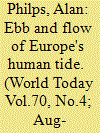

|
|
|
|
|
| Publication |
2014.
|
| Summary/Abstract |
For each country the orange area and the figure in light type represent the percentage of migrants in the population in 1990. The red area, with the bold figure, shows the proportion in 2013. In these UN figures, migrants are defined as those born outside their country of residence, including refugees
|
|
|
|
|
|
|
|
|
|
|
|
|
|
|
|
| 5 |
ID:
132389


|
|
|
|
|
| Publication |
2014.
|
| Summary/Abstract |
The European Commission has spelled out its policy ambition for EU energy cooperation with the southern neighbourhood with plans for the establishment of an 'Energy Community'. Its communications make clear that an Energy Community should be based on regulatory convergence with the EU acquis communautaire, much in the same vein as the existing institution carrying the same name; the Energy Community with Southeast Europe. It is puzzling that the Commission insists on repackaging this enlargement concept in a region with very different types of relationships vis-à-vis the EU, especially when considering the lukewarm position of key stakeholders in the field. According to them, any attempt to introduce a political integration model in this highly sensitive issue area in the politically fragmented MENA region might run the risk of hurting the incremental technical integration process that has slowly emerged over the past few years.
|
|
|
|
|
|
|
|
|
|
|
|
|
|
|
|
| 6 |
ID:
130915
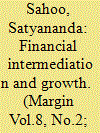

|
|
|
|
|
| Publication |
2014.
|
| Summary/Abstract |
The article empirically evaluates the role of financial intermediation in India's economic development. An assessment of various indicators of financial development reveals that both the bank-based and market-based intermediation processes have undergone remarkable improvements in the last six decades. While credit disbursement by Indian banks has increased sharply in the past decades, it is still below the world average level and even below the level of its emerging market and developing economies (EDEs) peers. However, in recent years, the market capitalisation of the Indian stock market has increased indicating greater reliance on market-based sources of funding. One-way Granger causality from private sector credit to real GDP confirms the supply-leading process of bank intermediation, while no causality was found between stock market capitalisation and real GDP. The ARDL co-integration test suggests that both the bank-based and market-based financial deepening have positive roles in driving India's economic development, while the former has a stronger role in driving India's economic growth. The findings indicate that in a relatively bank-centric financial sector, Indian banks have the potential of further channelisation of credit to productive sectors of the economy.
|
|
|
|
|
|
|
|
|
|
|
|
|
|
|
|
| 7 |
ID:
131892
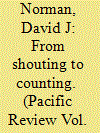

|
|
|
|
|
| Publication |
2014.
|
| Summary/Abstract |
This article explores the emergence of new spaces for civil society organisations (CSOs) as a result of an increasing interest by international donors in multi-stakeholder approaches to good governance under the 'new policy agenda'. Drawing upon a contemporary case study of civil society in Cambodia, it argues that CSOs have been encouraged to perform two key roles on a national level: professional service delivery agents and democratic watchdogs. Both roles are seen by donors as integral to supporting an accountable and professional model of the Cambodian state while drawing upon valuable private sector lessons in a synergetic model of governance. The result is the construction of particular neoliberal spaces for CSOs operating as technical implementation mechanisms in response to externally driven donor pressures. Furthermore, under this new framework of governance, CSOs face pressure to undergo internal transformation akin to new public management reform; embracing economistic and administrative modes of coordination as core values of civil society participation.
|
|
|
|
|
|
|
|
|
|
|
|
|
|
|
|
| 8 |
ID:
133846
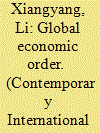

|
|
|
|
|
| Publication |
2014.
|
| Summary/Abstract |
After the end of the cold war, the global economy has been characterized by globalization. This is reflected in the growing transnational flow of goods, services and factors of production. It is also reflected in the global economic order and rules constraining transnational flows. Doubtless, the transnational flow of goods, services and factors of production can benefit participating countries.
|
|
|
|
|
|
|
|
|
|
|
|
|
|
|
|
| 9 |
ID:
131704
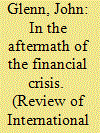

|
|
|
|
|
| Publication |
2014.
|
| Summary/Abstract |
This article examines the financial reforms that have been undertaken through two perspectives on risk: that of Beck's world risk society and an alternative Foucauldian approach. The former argues that, catastrophes such as the recent financial crisis will induce a political shift towards a cosmopolitan form of statehood. Yet, the lack of radical reform since the financial crisis would suggest otherwise. The article therefore argues that what we are witnessing is best understood in terms of reflexive governance in which the various rationalities of risk are reassessed and strengthened in order to avoid a similar occurrence in the future. Moreover, in response to the uncertainty that surrounds such rare events, more intense forms of surveillance have been adopted with the objective of pre-empting any future crisis. Yet, for various reasons, the reforms remain rather limited and the new rationality of pre-emption is unlikely to prevent further crises from occurring in the future.
|
|
|
|
|
|
|
|
|
|
|
|
|
|
|
|
| 10 |
ID:
133842
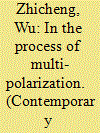

|
|
|
|
|
| Publication |
2014.
|
| Summary/Abstract |
The international system is the relatively stable framework of international relations constituted by various international actors, and represented by the great powers. The various international actors interact with one another in the framework. Therefore, against the current background of deepended globalization.
|
|
|
|
|
|
|
|
|
|
|
|
|
|
|
|
| 11 |
ID:
133001
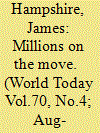

|
|
|
|
|
| Publication |
2014.
|
| Summary/Abstract |
Europe has emerged as one of the world's two major destination regions for immigrants since the 1990s. Today, there are 49.9 million international migrants in the European Economic Area, just slightly less than 50 million in North America. Europe is clearly a continent on the move, but it is equally clear that many Europeans are ill at ease with this.
|
|
|
|
|
|
|
|
|
|
|
|
|
|
|
|
| 12 |
ID:
131706
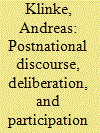

|
|
|
|
|
| Publication |
2014.
|
| Summary/Abstract |
An emerging task in world politics is to cope with human-induced global risks in domains such as environment, economy, security, and health. Current global governance institutions are largely incapable of tackling global risks and applying deductive policy models, which is why new modes of interaction may become essential. In this article I argue that through focused discourses, key peculiarities of global risks, namely complexity, scientific uncertainty and sociopolitical ambiguity, may be identified and understood. To this end, distinctively discursive and pragmatic learning processes can be developed. Different forms of deliberation and participation help develop processes that meet the challenges, problems, and conflicts that result from the key peculiarities of global risks. Hence, the article establishes a causal link between key peculiarities of global risks and postnational discourses. I discuss the varying forms of deliberation and participation (epistemic institutions, associational policy making, and transnational public deliberation and participation) of three discourses that produce institutional problem solving capacity in global risk governance. To this end, this article links theory and practice as well as normative conceptualisation and institutional feasibility.
|
|
|
|
|
|
|
|
|
|
|
|
|
|
|
|
| 13 |
ID:
132714


|
|
|
|
|
| Publication |
2014.
|
| Summary/Abstract |
All ideological reflections on energy made by American political scientists reveal the same key approaches as in the overall policy - the same double standards and the obvious desire to create controlled chaos. One can endlessly redraw the global energy map and rearrange key players on it while firmly believing in the enormous potential of unconventional hydrocarbons, as our American counterparts do, but a sincere belief alone would not be enough to bring about serious changes into the world energy market. However, it would be more than enough to convince the audience whose hopes for new and - most importantly - cheap energy resources render it incapable of making a sober assessment of reality. We have been witnesses to this information thrust from overseas over the past five years, as it is vividly evidenced by an article America's Energy Edge: The Geopolitical Consequences of the Shale Revolution by two American authors Robert D. Blackwill and Meghan L. O'Sullivan. The ideologists of a shale oil and gas revolution remain true to themselves - the audience needs to be constantly reminded that the global energy sector is no longer what it used to be five years ago and that its main actor now is the United States.
|
|
|
|
|
|
|
|
|
|
|
|
|
|
|
|
| 14 |
ID:
132713
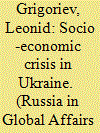

|
|
|
|
|
| Publication |
2014.
|
| Summary/Abstract |
Ukraine's main chance of entering Europe not as a source of labor force, but as a moderately developed industrialized country will be to go ahead with exports to Russia and other countries where Ukrainian manufactures are in demand.
Ukraine's socio-political and economic crisis did not emerge out of nowhere and it will not die down all by itself. It has lasted throughout the period of post-Soviet transformation, and there are no immediate reasons to hope it will end soon. Our observations made from the very outset of this process1 provide ample reasons to postulate that the original expectations of progress have failed to materialize. In 2007 we maintained that Ukraine had very good chances of taking a worthy place in Europe by virtue of the potential competitive edges of the Ukrainian economy, but that would require hard work, patience, time and a coherent policy. Over the past five to ten years, in particular, in the context of the current political crisis, that chance has been wasted and, regrettably, another one may offer itself only in the distant future
|
|
|
|
|
|
|
|
|
|
|
|
|
|
|
|
| 15 |
ID:
131595


|
|
|
|
|
| Publication |
2013.
|
| Summary/Abstract |
This article attempts a diagnosis of the global governance crisis especially in the light of the global financial crisis, and critically solutions proposed by various experts and scholars. Finally, it offers the recommendations through a balanced approach that takes into consideration practical realities of the integrated economic world order. Its explore the alternative role of the BRICS countries (Brazil, the on, India, China, and South Africa) in global economic global governance
|
|
|
|
|
|
|
|
|
|
|
|
|
|
|
|
|
|
|
|
|